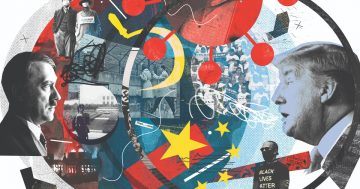It is difficult to grasp the force of the prohibition on “presentism” without understanding the political backdrop against which it developed: the Cold War and the liberal internationalism endorsed by most Anglo-American historians. The profession’s current anxiety over presentism is a legacy of the Cold War university, which sought to resist the radicalism of a new generation of historians emerging in the 1950s and ‘60s, as well as push back against the postmodern turn of the 1970s. This inherited resistance inhibits a more thoughtful engagement with our current crises. We have been left strangely ill-equipped to confront history’s return.
Prohibitions against presentism are typically couched in philosophical or ethical terms. To commit the error of presentism, says the Yale American Studies scholar Wai Chee Dimock, is “to be blithely unaware of historical specificities, to project our values onto past periods without regard for the different norms then operative.” This is a kind of “narcissism,” she says, which “erases the historicity of texts.” Michel Rolph-Trouillot could claim, in 1995, that “academic historians tend to keep as far away as possible from historical controversies that most move the public of the day.”
More here.

 Scholars and nonscholars alike are struggling to make sense of what is happening today. The public is turning to the past — through popular podcasts, newspapers, television, trade books and documentaries — to understand the blooming buzzing confusion of the present. Historians are being called upon by their students and eager general audiences trying to come to grips with a world again made strange. But they face an obstacle. The Anglo-American history profession’s cardinal sin has been so-called “presentism,” the illicit projection of present values onto the past. In the words of the Cambridge University historian Alexandra Walsham, “presentism … remains one of the yardsticks against which we continue to define what we do as historians.”
Scholars and nonscholars alike are struggling to make sense of what is happening today. The public is turning to the past — through popular podcasts, newspapers, television, trade books and documentaries — to understand the blooming buzzing confusion of the present. Historians are being called upon by their students and eager general audiences trying to come to grips with a world again made strange. But they face an obstacle. The Anglo-American history profession’s cardinal sin has been so-called “presentism,” the illicit projection of present values onto the past. In the words of the Cambridge University historian Alexandra Walsham, “presentism … remains one of the yardsticks against which we continue to define what we do as historians.”